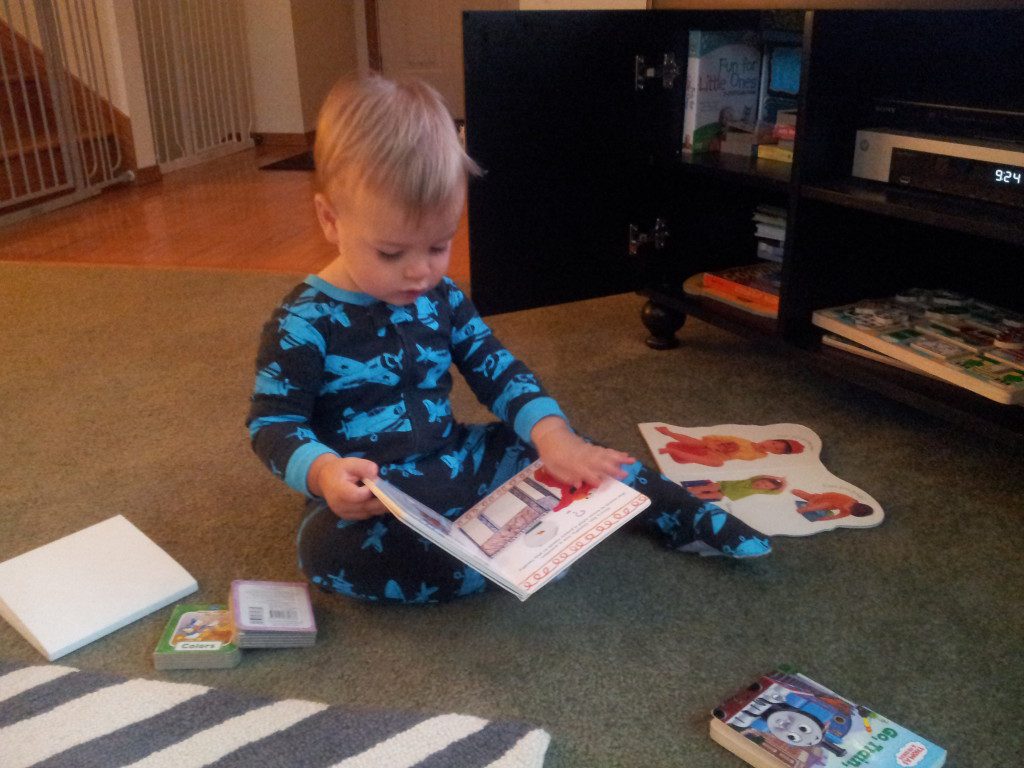A year ago, my son was about to turn 2 and had never said the word “Mama.”
Or “Dada.” Or “ball.” Or “up.” Mason was silent and stoic, and we were nervous.
 Our pediatrician frowned at the communication questionnaires I filled out and recommended speech therapy. I frantically Googled things like “2 year old won’t talk” and tried to ignore the voice in my head.
Our pediatrician frowned at the communication questionnaires I filled out and recommended speech therapy. I frantically Googled things like “2 year old won’t talk” and tried to ignore the voice in my head.
We did everything we could think of to get him talking. We talked and read to him constantly, we bought flashcards with bright pictures on them, we implemented ideas from the book our pediatrician recommended.
I remember being with Mason at the library and chatting with another mom, whose son was 9 months younger than mine and talking up a storm. I was so envious of their interactions. “You’re right, that is a ball! Yes, a blue ball!” When she asked how old my son was and I told her, she looked confused. (Or maybe I just imagined it.)
During a parent-teacher conference at Mason’s daycare, I saw two words on his development report that I’ll never forget. Under communication skills: “extremely delayed.” I went home in tears.
Today, Mason is a few months from his third birthday, and he’s a total chatterbox. His vocabulary includes hundreds of words–too many to count, and more every day. His pronunciation isn’t as sharp as some kids’, and his sentences aren’t quite as sophisticated, but you’d never guess that a year ago he was only babbling.
If you’re the mom of a quiet toddler: be encouraged.
We all know that every child is different, and that they all learn at their own pace–or at least, we “know” that–but those darned milestones have a way of shaking our faith. (Unless our kids are meeting them early, in which case: look how smart they are!)
And of course, we ALL have friends whose kids are doing things sooner/better/easier…
One thing I’ve learned is to to recognize when a behavior is more a reflection of my son’s personality than his development or my parenting. Even though he’s talking now, Mason is still a reserved kid by nature. It takes him awhile to warm up to new environments and new people, and until he does that, he’s quiet. (I know: not the worst thing in the world for a toddler!)
Oh, and we did get that speech therapist, for a few months. She was wonderful with Mason, but she helped me even more. She had complete confidence in my son, when my own was faltering, and she gave me things to do so I could feel like I was “helping.”
In the end, though: my son talked when he was ready. Not a second sooner.
If you’re the mom of a late talker, and you find yourself wanting to feel like you’re helping, here are a few ideas to try. (This is a mix of tips and tricks from our speech therapist and our own experiences–but as always, remember that every child responds to things differently!)
Get your child’s ears checked
I was extremely reluctant to do this, since Mason seemed to hear fine–he reacted to sounds, responded to his name, etc. But even a small amount of hearing loss can impair speech development. (I’ve read that it’s like being underwater–imagine trying to learn a foreign language that way!)
In the end, a visit to the audiologist did detect some hearing loss, and the doctor recommended ear tubes. Mason didn’t start speaking until several months after the tubes, so we’re not sure how much we can credit them with his progress, but we definitely didn’t regret getting them. (Bonus side effect: no ear infections!)
Figure out what motivates your child
This was our speech therapist’s very first piece of advice. The idea is to teach kids that communication helps them get things they want–it’s not just for pleasing Mom and Dad. So instead of encouraging them to talk just for the sake of talking (“can you say Mama?”), save the prompting for things they care about.
Food and drink are common motivators. If your child wants a drink, withhold the cup a little bit and see if he’ll say “milk” (or whatever) to get it.
Encourage interaction through sounds
Sounds are precursors to speech and a great place to start. Talking about animal sounds is perfect for this, especially if your child is into animals.
Our son was into one thing, and one thing only: cars. So, our speech therapist encouraged as much vroom-vrooming and beep-beeping as possible.
Let them finish
Mason’s first word was “go,” and we got him to say it by prompting him with the phrase “ready, set, go.” We started using the phrase while playing with his cars, and once we were sure he was familiar with it, we’d say “ready, set…” and then wait. We did this over and over and over, and eventually, it clicked.
This method works great with books too–especially rhyming ones. Once you’ve read the child the book several times, try pausing before the last word of an easy sentence to see if he’ll fill in the blank. We still do this all the time with Mason, and he loves the opportunities to participate.

Get the child’s attention
We were coached to come down to Mason’s eye level and wait until he looked at us to speak (when prompting him). It was amazing how often we weren’t taking the time for this simple step.
Wait longer than usual for responses
We noticed that if we gave Mason a prompt and he didn’t make an effort to respond right away, we’d keep repeating the prompt. “Up? Can you say up? Do you want up?” But the problem wasn’t that he hadn’t heard us.
Eventually, we learned to wait an uncomfortable amount of time after a prompt, to give him plenty of time to respond if he wanted to.
Keep the pressure off
Mason used to get (actually, still gets) stage fright if he felt like he was being put on the spot. Sometimes, when he’d be playing alone, I’d overhear him making car sounds and bud in with comments like, “that’s right, buddy, vroom-vroom!” When he’d realize I’d been listening, he’d look flustered and immediately clam up. #fail!
Make a personalized picture book
Mama and Dada are often kids’ first words because they’re easy to say. But for some kids, the in-their-face interaction that’s usually happening when they’re taught those words can be intimidating. It can be helpful to encourage speech while focusing on something else–like a book.
We got a blank board book, like this one, and filled it with pictures of my husband and I, as well as all of Mason’s favorite things: a car, a truck, Elmo, and Mickey, plus some easy-to-say words like dog and ball. He loved it!
Don’t let the milestone police get you down
In retrospect, I wish I wouldn’t have let my pediatrician’s concerns get to me so much. I understand the importance of early intervention in some cases, but my son wasn’t showing any other concerning signs, and I had so many people (including the speech therapist) assuring me he’d catch up. Why was I so focused on the worst case scenario?
My final tip (and this applies to basically anything parenting-related): whatever you do, beware of Google!
To mimic what I heard many, many times during that phase: hang in there, Mama. Before you know it, your kid will be talking your ear off, and you’ll look back with fondness on those sweet, silent days.













This post makes my “speech therapist heart” so happy! Great tips for facilitating language! Check those ears, create many opportunities for speaking, keep it routine and predictable (predictable books, daily routines, ready set go, songs with finger plays), leave off the last word in the sequence and wait for a response, withhold desired items to facilitate requesting and be sure not to anticipate their every need without giving them the opportunity to request.
Phew, I’m glad you approve! It’s been awhile now, so I was crossing my fingers that I was remembering/representing everything accurately!!
I have a 2 year old that babbles and only says a handful of words. I have been putting off his 2 yr checkup bc I know he is delayed and am scared to face it. Thank you for your post!
This article was almost like reading my sons life story. He started speech therapy right after he turned 2, and still has services while going to preschool. He is still a bit behind, but getting there. I love hearing his little voice, when just a year ago he would only say maybe 10 words on a good day. He didn’t babble, didn’t have any imaginary play or even interact with any kids that didn’t involve tears. Now…dude is non-stop. He has conversatiosn with his cars, sings songs (not in a group…not there yet, but after the group is done) and even asks the best questions. I am forever thankful for his ST, she changed his/our lives 🙂
I never knew how bad my son’s speech was until he had ear tubes at 21 Mon. Within days his vocabulary increased and his words were clearer.
As the mom of two deaf girls’, I definitely think that having their hearing checked should be proposed as more of a necessity if a child isn’t talking at two. In fact, if a child isn’t talking/jargoning by one, I’d definitely say to have their hearing checked! It’s all about early intervention for some kids and the diffetence the first three years make in the rest of a child’s life.
I am a speech-language pathologist and I just want to say that while I really love this article, I encourage families with young children who have not met some important milestones to do these tips AND seek an evaluation from speech, occupational, or physical therapists (as appropriate to the concern). An evaluation and even therapy (if recommended) can’t hurt and can get you started in very important Early Intervention if there IS a bigger concern (like Autism Spectrum Disorders). I just get nervous when I read some articles that send the “don’t worry” message too much. We have these milestone guidelines to help us identify when therapy may be needed and if started early, delays can be remediate much sooner. I was thankful to read that you did in fact use a speech therapist and I’m happy you found her helpful. If your son had been diagnosed with something more serious, her intervention would have been critical.
My husband, who is now a gregarious Ph.D. who reads and writes multiple languages, was over two years old before he started talking. You just never know. =)
Hugs to you. I have 3 kiddos myself all were late talkers, 2 1/2 before making any real sounds/words. I partially attributed it to being a stay at home momma with them 24/7 so we had our own communication in ways, but have no fear…….they all began talking and now I am lucky to get a word in edgewise with all the chatter between the 2, 4 and 6 year old. Thank you for sharing your personal story to help others.
Thank you for posting this. It’s remarkable how your words came at the perfect time for me. You’re a bit of a blessing for me right now, reading this. We’re going through a similar situation with my son who is 3 1/2. He was a bit slow to talk and when he did, not much was understandable. When we’re around other people, it’s worse and he won’t speak. I felt like I had to convince people that he does actually speak because parents are so easy to pass judgement and get a funny look like you KNOW the word autism is running through their head. I think we all want our kids to excel in everything they do. My faith started to lack as well, when we had an ER pediatrician pull me out of a room for a visit and tell me how concerned she was with his speech. His doctors had previously mentioned go holding his speech through a program, but this doctor pulled me out on the spot, never meeting my child before and told me he was a delayed child and we needed to check on this quickly. For some reason, my heart shattered. I tried to be patient with him, knowing how extremely shy this boy was, how reserved and private he was with people he knew. So my faith fell when she did that. We had set up a speech appointment, went, and to my amazement, opened up to this young lady in such an amazing way I cried. There was NOTHING wrong with him. His language was above his level, his articulation needed work, but that’s because he’s not around children everyday. Like I had tried to convince myself, he was fine, just shy. He spoke when he wanted and he definitely wasn’t going to if he didn’t. He shy, stubborn, independent kid. Partially like his mama. So thank you Kim for posting this, they’re not identical stories, but it’s refreshing to know that I’m not the only mom experiencing these feelings.
I can relate. My son (my second) was 26 months and at every well check I kept telling the pediatrician- he’s not talking, not babbling, only laughs or cries. As a pediatric nurse and seeing kids everyday, I knew his behavior was not just him being a quiet, passive child. He was frustrated due to being unable to communicate. I independently took him to a private speech therapist- they assured me that they would get the order- since I couldn’t convince the Dr that my son had a problem. He was diagnosed with a severe speech delay (6-9 month level). After 2 months, he was signing and she was teaching him simple words/commands, the tantrums dropped in half (this child spent a majority of the day crying and screaming), by six months he had developed 50-75 words, and by a year when he “graduated” from speech tx he was speaking 200-250 words! He continued to have a little problem with articulation of many letters until he was about 6-7 years old, but once the boy started talking up a storm he became a much happier child.
My advice- if your gut tells you something isn’t right and your pediatrician isn’t listening, I’d try to find someone who will listen.
When my then 2 yr old didn’t talk we went though the same things. However my pediatrician thought our son was fine but “didn’t want to get burned” and reluctantly advised speech therapy. Our speech therapist at the time was not encouraging. But we kept trying. I tried to ignore the autism, autism, autism screaming in my head. But if I did ignore it, he would not have received his early intervention. He was diagnosed with autism at 3.5. He started talking a little before his 4th bday. He is now a chatterbox 8 yr old who still struggles but without early intervention would be no where near where he is.
My point being…I’m so happy your situation ended up well. But do not ignore that nagging feeling. Not every situation turns out to “not be autism.” I would have given anything for just hearing loss at the time. But I now look back and am thankful he was diagnosed because it opened doors to get his the right help and therapies he needed.